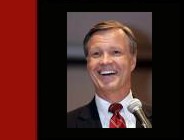Christopher Cox
last updated: January 12, 2009
Please note: The Militarist Monitor neither represents nor endorses any of the individuals or groups profiled on this site.

Affiliations
Government Service
Private Sector
Education
Christopher Cox served as chairman of the Securities and Exchange Commission (SEC) in the second term of the George W. Bush administration; prior to that, he represented California in the House of Representatives for 17 years. A hawkish Republican who has served as an adviser to the Center for Security Policy 1 (a neoconservative-aligned advocacy group founded by Reagan-era Pentagon official Frank Gaffney), Cox used his House seat to promote defense programs and military intervention in the Middle East. 2 Later, his SEC tenure was marred by scandals over the commission’s failure to properly regulate financial markets, which was blamed for enabling the fraudulent activity of money managers like Bernard Madoff. 3
While in the House, where he served for several years as chairman of the Homeland Security Committee, Cox’s bête noire was China. In 1998, he headed a House Select Committee (which came to be known as the Cox Committee) that investigated the alleged Chinese acquisition of sensitive U.S. technology. The "Cox Report," released in 1999, alleged extensive Chinese spying in the United States and claimed that the country had obtained U.S. nuclear bomb designs. However, when asked to provide evidence, Cox repeatedly demurred. 4
Chalmers Johnson reported, "When asked whether he had any evidence for his cries of alarm or his charges against citizens who were given no chance to defend themselves, Cox invariably replied that he did but it was classified. He could not show it to us. As reported in the May 26 Los Angeles Times, when challenged on the number of Chinese ‘front companies’ mentioned in the report, Cox said he could not offer a specific estimate ‘because the government’s estimates are secret.’ He had used the number 3,000, he said, ‘to suggest the possible scope of the problem’ and to make the point that the number ‘overwhelms our limited resources.’… James Mulvenon of the Rand Corporation, a specialist on the Chinese military’s commercial activities, puts the number of front companies at between 12 and 30. In 1997, the State Department could identify only two.” 5
The CATO Institute, a libertarian think tank, also criticized the report, charging that it had embellished the China threat, in part because China has at most a few hundred nuclear weapons compared with the thousands in the U.S. arsenal. 6
Cox is a hardline nationalist with a track record of supporting controversial Pentagon programs like missile defense. After the 9/11 attacks, he promoted an aggressive “war on terror,” including the invasion of Iraq. 7 In the foreword to the 2005 Heritage Foundation book Winning the Long War: Lessons from the Cold War for Defeating Terrorism and Preserving Freedom, Cox borrowed the rhetoric of many neoconservatives in portraying terrorism as an existential threat to civilization. He wrote, “The true conflict is between the billions of people who together comprise civilization, and the relatively tiny, but lethal, portion of humanity that would annihilate us all. Civilization will win, if only we will marshal our superior energies and resources. In that case, our victory is assured because we are more numerous; because we have superior technology, tools, weapons, and information; and most important of all, because we embrace the essential dignity of man, the nobility of the human spirit, and the ideal of liberty—which, unrestrained, is the most powerful force on earth.” 8
SEC Nomination and Background
George W. Bush nominated Cox to chair the Securities and Exchange Commission in June 2005, after William Donaldson announced his resignation. The SEC nomination drew sharp criticism from activists and commentators who raised concerns about Cox’s strong relationship with big business. Lee Drutman of the group Citizen Works argued, "Looking at Cox’s legislative record, the main philosophy that emerges is one of doing favors for business, happily taking their campaign contributions, and then proclaiming that the free market works. (According to the Center for Responsive Politics, 97% of Cox’s 2004 reelection campaign was funded by corporate political action committees or executives of companies and their family members. Since first being elected to Congress in 1988, he has received more than $254,000 from the securities industry).” 9
Critics also pointed to Cox’s 1995 sponsorship of a bill to limit investors’ ability to sue their companies if the firms were suspected of securities fraud. The bill became one of only two that were pushed through after a Clinton veto. 10
Cox’s performance as SEC chair was condemned by Sen. John McCain (R-AZ) during his presidential run. In September 2008, McCain declared that if he were elected president, he’d fire Cox, saying, "You can’t wait any longer for more failures in our financial system." 11
In late December 2008, Cox refused to take any responsibility for the collapse of the financial markets, though others pointed to actions he took that seemed to directly contribute to the mess. For example, his SEC predecessor had established a seven-person Office of Risk Assessment “to spot emerging problems in the financial markets.” Yet under Cox’s tenure, the “office” shrunk to just one person. 12
After obtaining dual degrees at Harvard in business and law in 1977, Cox worked as a clerk in the U.S. Court of Appeals before becoming an associate at the law firm of Latham & Watkins, which specializes in international corporate law. He then returned to Harvard for a couple of years to teach federal tax law before returning to the firm as a partner, where he stayed until 1986. That year, President Ronald Reagan tapped him to serve as White House counsel, a position he held until his 1988 election to Congress. 13
